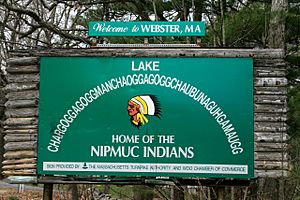Loup language facts for kids
Quick facts for kids Loup |
|
|---|---|
| Pronunciation | [lu] |
| Native to | United States |
| Region | Massachusetts, Connecticut |
| Ethnicity | Nipmuck? |
| Extinct | 18th century |
| Language family | |
| Linguist List | xlo Loup A |
| xlb Loup B | |
Loup was an Algonquian language, or maybe a group of languages, spoken a long time ago in what is now New England in the United States. The name "Loup" means "Wolf" in French. French explorers and settlers used this name, but they weren't always consistent about which language they were talking about. Today, when we talk about Loup, we usually mean two different language types: Loup A and Loup B. These languages are now extinct, meaning no one speaks them anymore.
How We Know About Loup
We know about Loup A mostly from a list of words. This list was written down by French missionaries at the St. Francis mission in Quebec. They recorded these words from Native American refugees, possibly from the Nipmuck people. The descendants of these refugees later started speaking a language called Western Abenaki.
Loup B refers to another list of words. This second list shows many different ways of speaking. It might not be a completely separate language. Instead, it could be notes about the speech of various Native American refugees from New England who were living in French missions.

Sounds of Loup A
Even though Loup A is an extinct language, experts called linguists have studied the old word lists. They have tried to figure out what the sounds of Loup A were like. This helps us understand how the language might have been spoken.
For example, the vowel sounds in Loup A were probably similar to those in other Algonquian languages spoken in southern New England. Linguists believe that short vowel sounds like /i/, /o/, /e/, and /a/ might have sounded like the vowels in words such as "bit," "put," "bed," and "cut." Long vowel sounds like /iː/ and /oː/ would have been held longer, similar to the vowels in "feet" and "boat."
 | Sharif Bey |
 | Hale Woodruff |
 | Richmond Barthé |
 | Purvis Young |

